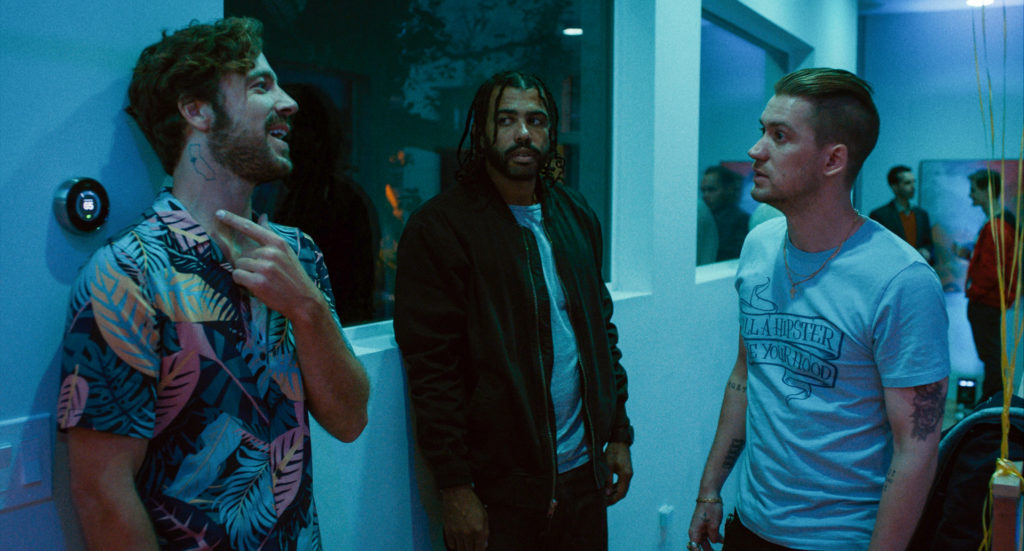2018 has been an excellent year for high-profile critical successes that deal with issues of race, violence, and gentrification in America. Spike Lee took on the KKK with Black KkKlansman; Boots Riley scored a critical success with his socialist masterwork Sorry To Bother You; Ryan Coogler gave us an African utopia with Black Panther. Teen films, including A Wrinkle in Time and the more somber The Hate U Give, dealt with the meaning of race in a shifting cultural landscape, hope for America’s future, and the necessity of grappling with increasing racial violence in America’s present. But among the most nuanced narratives that deals with the complexities of identity in America was Blindspotting, directed by Carlos Lopez Estrada, written and produced by its stars Daveed Diggs and Rafael Casal. The film is now in release on streaming and Blu-ray, which means that no one has an excuse to not see one of the best films of the year.

Blindspotting features Diggs as Collin, a man with only a few days left on his parole. He’s put his life back together, working for an Oakland moving company with his friend Miles (Casal), trying to mend fences with his ex-girlfriend Val (Janina Gavankar), and trying to avoid getting into any kind of trouble, however small. He’s limited in his movements—he has a nightly curfew, has to hold down a job, and avoid involvement with the police. This isn’t helped by the jumpy, short-tempered Miles, who goes off the rails at the slightest provocation. Collin drives home one evening, already a little late for his curfew, and stops a red light, where he witnesses a white police officer shooting an unarmed black man in the back. He’s now faced with a dilemma—tell what he knows, fully aware that he’s a former felon out past curfew, or do nothing. This is further complicated by racial realities in Oakland, and the question of whether he would even be believed.
Blindspotting’s focus is more on the nature of Collin and Miles’s lives than it is on the crime Collin witnesses. The shooting happens at the beginning of the film and so forms a consistent backdrop to the other events, as the film hones in on a developing a sense of the “blindspot” in Miles and others. Despite growing up together, despite their friendship and their closeness, Miles does not recognize that his behavior endangers Collin, nor that there is a fundamental difference in the way they’re perceived because of their skin color. Those difference come out in some subtle and not-so-subtle ways, from Miles being more comfortable in yelling at other people, and Collin being aware that having a gun in the truck puts him in more danger. Collin more staid than Miles in general, but the film depicts this both as a difference in personality and as a difference shaped by race. Collin knows that he’s a target, and that his blackness means that he can potentially be blamed for what Miles does. The film plays with the audience’s perceptions and focus on a regular basis, alternatively showing Miles as a charming grifter and as a dangerous hothead, focalizing scenes through Collin’s eyes as he grows angrier and more frightened. This forces the audience into a position to experience his fear and the limitations of his everyday life. But this experience is not set up a black/white binary; the film is about perception, about how people see other people dependent on race, on class, and on individual situations and prejudices. The film sees all of this as a tapestry, interweaving individual experience and personalities with cultural realities.
The Blu-ray release of Blindspotting features a number of extras, including the obligatory making-of featurette and director’s diary. There’s a set of deleted scenes that are not necessary to the final product, but do develop the relationship between the characters, including several sequences in which Miles and Collin rap about the changes in and gentrification of Oakland. Most interesting, however, are two feature-length commentaries – one with director Carlos Lopez Estrada, the other with Diggs and Casal. The rapport between Diggs and Casal is as entertaining as the interplay between Miles and Collin onscreen. They discuss the gentrification of Oakland, the use of costuming, location, experiences from their own lives (including friends and former classmates as extras), and the themes they were concerned with, interpolated with humorous stories about the shooting of the film. Both it and the more technical discussion from Estrada are illuminating features, and make the price of the Blu-ray more than worth it.
Blindspotting should be in the awards conversation this year, but even if it isn’t, it will remain a testament to the power of cinema to depict, and criticize, contemporary life in America with humor and energy and dynamic performances. If you haven’t seen it, now’s the time.
Blindspotting is now available on Blu-ray, DVD, and VOD.

